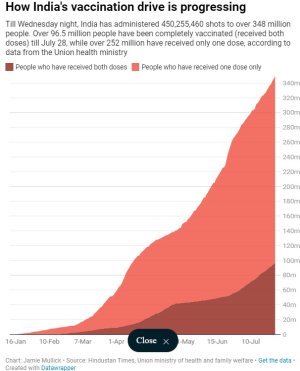Production ramped up, 13.5 crore jabs will be available in July
Top government sources, part of the team monitoring the Covid-19 vaccination drive, said states will be informed that 75 percent of the 13.5 crore doses will be made available free of cost in July for advance planning.
Around 13.5 crore doses will be made available in July by the country’s vaccine manufacturers for the Covid-19 immunisation drive, even as Monday onwards the Centre will exclusively procure and distribute vaccines to the states free of cost to administer them to everyone above 18 years, The Sunday Express has learnt.
Top government sources, part of the team monitoring the Covid-19 vaccination drive, said states will be informed that 75 percent of the 13.5 crore doses will be made available free of cost in July for advance planning.
The increase in availability of doses comes just two months after the country’s two vaccine manufacturers had started augmenting capacity. Sources said that from 7.5 crore doses in May, 12 crore doses will be available by the end of June as the revised guidelines for vaccination come into effect from Monday, where states will no longer be involved in vaccine procurement from open market.
“The conservative estimate of availability of doses for July will be approximately 13.5 crore,” a source said. “May was a critical month from the point of view of vaccine supply — in April-May, vaccine manufacturers were augmenting capacity. They have done this to almost 50 percent, and the remaining augmentation will be done by June-end. The results can be seen in July-August — more in August, but significant also in July.”
Also Read |From Corbevax to Covovax: All you need to know about India’s new Covid-19 vaccines
Sources also said that results of ramping up of Covaxin production will start showing in August. With manufacturer Bharat Biotech having begun augmentation, sources said 2.5 crore doses will be available in July. “The revised guidelines, along with enhanced production capacity, will show an accelerated speed as well as accelerated coverage, because in effect vaccine doses are now free for all age groups at government vaccination sites,” a source said.
Under the new guidelines, states will aggregate the demand of private hospitals, keeping in view equitable distribution between large and small private hospitals and regional balance.
On Sunday, it is learnt, the Centre will hold a meeting with private hospitals — the first of its kind — on facilitating supply of vaccines to small private facilities and their payment through the National Health Authority’s (NHA) electronic platform.
“At one point, there were 8,000 vaccination sites at private hospitals from January and April,” the source said. “That number fell to 1,700 in May. There was greater participation earlier because small hospitals were receiving doses from the Centre by depositing Rs 100 in the NHA account. In May, they had to negotiate directly, which was very difficult. Now states have done aggregation, which will enable them again to be part of the vaccination drive.”
“We will have an interaction with private hospitals tomorrow (Sunday). This will also lead to greater speed and coverage,” the source added.
The Centre procured 100-percent doses between January 16 and April 30 this year and provided them free of cost to states to administer vaccines to healthcare and frontline workers, and everyone above 45 years. From May 1, states and private hospitals were allowed to procure 50 percent doses from the open market to vaccinate people in the 18-44 age group.
From Monday, the Centre will exclusively procure 75 percent vaccine doses and distribute them free to the states to vaccinate everyone above the age of 18. The decision came after several states communicated to the Union government that they prefer going back to the centralised procurement system, as many of them were facing difficulties in managing funding, procurement, and logistics of vaccines.
https://indianexpress.com/article/india/production-ramped-up-13-5-cr-jabs-will-be-available-in-july-7366917/







